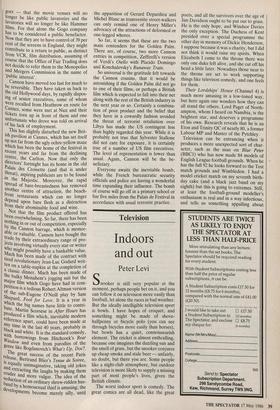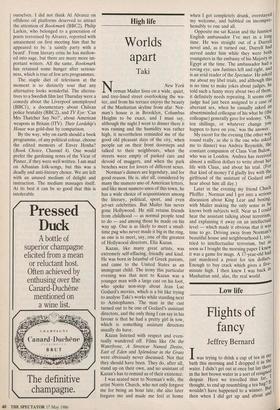Television
Indoors and out
Peter Levi
Snooker is still very popular at the moment, perhaps people bet on it, and you can follow it on television more easily than football, let alone the races in bad weather. But the ideally intelligible television sport is bowls. I have hopes of croquet, and something might be made of shove- halfpenny or bicycle polo (you can see through bicycles more easily than horses), but bowls has a quiet, connoisseurish element. The cricket is almost enthralling, because one imagines the dazzling sun and the smell of grass, but the snooker conjures up cheap smoke and stale beer — unfairly, no doubt, but there you are. Some people like a night-club atmosphere, but outdoor television is more likely to supply a missing part of most people's lives, given the British climate.
The worst indoor sport is comedy. The great comics are all dead, like the great poets, and all the survivors over the age of Jim Davidson ought to be put out to grass.
He is the only hope, and Windsor Davies the only exception. The Duchess of Kent presided over a special programme the other day in memory of Dickie Henderson, I suppose because it was a charity, but I did not think it would raise my spirits. When Elizabeth I came to the throne there was only one duke left alive, and she cut off his head a little later. Nowadays those near to the throne are set to work supporting things like televison comedy, and one feels for them.
Their Lordships' House (Channel 4) is much more amusing in a low-toned way, but here again one wonders how they can all stand the others. Lord Paget of North- ampton, whom I heard on Namibia, is the brightest star, and deserves a programme of his own. Research reveals that he is an Eton and Trinity QC of nearly 80, a former Labour MP and Master of the Pytchley. Television can be entrancing when it produces a more unexpected sort of char- acter, such as the man on Blue Peter (BBC1) who has now made 84 models of English League football grounds. When he has the full 92 he looks forward to the Test match grounds and Wimbledon. I had a model cricket match on my seventh birth- day cake (and a black jazz band on my eighth) but this is going to extremes. Still, at least the football-ground modeller's enthusiasm is real and in a way infectious, and tells us something appalling about ourselves. I did not think Al Alvarez on offshore oil platforms deserved to attract the attention of Bookmark (BBC2). Philip Larkin, who belonged to a generation of poets terrorised by Alvarez, reported with amazement on first meeting him that he appeared to be 'a saintly party with a beard'. From literary critic he has mellow- ed into sage, but there are many more im- portant writers. All the same, Bookmark has retained some hunger after serious- ness, which is true of few arts programmes.
The staple diet of television at the moment is so distinctly sour that any alternative looks wonderful. The alterna- tives to a Swedish film last Thursday were a comedy about the Liverpool unemployed (BBC1), a documentary about Chilean police brutality (BBC2), and TV Eye: 'Can Mrs Thatcher Say No?', about American weapons in Britain (ITV). Their Lordship's House was gold-dust by comparison.
By the way, why on earth should a book programme, of any political colour, choose the edited memoirs of Enver Hoxha? (Book Choice, Channel 4). One would prefer the gardening notes of the Vicar of Pinner, if they were well written. I am mad on Albanian folk-songs, but this was a deadly and anti-literary choice. We are left with an unused medium of delight and instruction. The medium massages itself. At its best it can be so good that this is intolerable.



















































 Previous page
Previous page